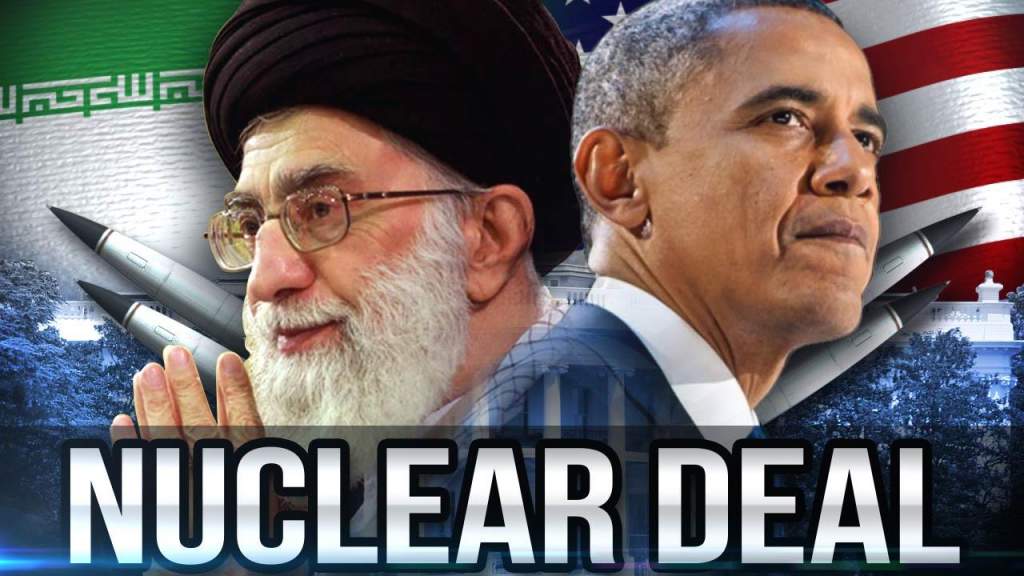LESSONS IN DIPLOMACY AND MILITARY STRATEGY

Once again I feel compelled to return to the issue of the Iran nuclear deal, and Western negotiators’ refusal to acknowledge that they are in way over their heads.
At this stage it seems utterly ridiculous to call them naïve, or to suggest that they are in denial. Rather, it appears that the White House, the State Department, and all those who are part of the US-led effort to reach an agreement with Iran, have simply decided that short of Iran formally announcing they are going ahead with a nuclear bomb program, the deal will be signed.
This past Tuesday night, Iran’s supreme religious leader, Ayatollah Ali Khamenei – whose views are all that count in the totalitarian theocracy that is the Islamic Republic of Iran – announced that his country would only dismantle its nuclear infrastructure if economic sanctions were lifted first. He added that there would be no freeze on research and development for the required ten-year period, and that third parties would never be allowed to inspect military sites.
In short, the West should lift sanctions while everything stays as it is and Iran remains committed to increasing its nuclear capacity, and while they prevent access to sites where nuclear warheads could be produced.
Frankly, who needs a formal announcement?
It is worth noting that John Kirby, the official US spokesman, responded by confirming that inspections of suspicious sites would be a key part of any agreement.
“For us, nothing’s changed about what’s necessary for a final deal,” he said, adding that this “includes access and transparency.”
These are words that just might come back to haunt him.
In any event, supporters of the deal, both in political circles and in the media, keep throwing out the same tired mantra – Khameini says these things to pacify his military and religious hardliners, who oppose making a deal. In the end, they argue, the deal will broadly reflect US objectives as outlined in the April framework.
I have two observations. The first is this: if there are military and religious hardliners in Iran who are more hardline than Khameini, and who intimidate him to the extent that is being claimed, then for the P5+1 group to sign a deal with Khameini – who to my untrained ear sounds about as hardline as one can sound – seems perilous in the extreme.
My second observation is much closer to home. Why is it that no one on the P5+1 side is saying or doing anything to pacify ‘hardliners’ in the West who oppose the deal?
Instead, Netanyahu, the Republican and Democrat dissenters, the Saudis, and most recently the former Israeli ambassador to Washington, Michael Oren, are vilified and maligned by pro-deal advocates, who seem intent on ensuring that we all hurtle headlong into Iran’s venomous embrace.
Ironically, while the deal-lovers on our side can understand the need for Iran to pacify hardliners, there seems to be no inclination on their part to do the same thing.
In the Torah portion of Hukkat we are introduced to the very first serious military confrontations between Jews and residents of the ancient Middle East.
The Jews are just beginning to hone their skills as a fighting force, in anticipation of the serious military campaign they would shortly be embarking upon – the conquest of the Promised Land.
One would not ordinarily look to the Torah for insights into diplomatic and military strategy, but the opportunity to see how Moses dealt with intransigent, ante-upping adversaries, with whom his nation had no dispute, nor any reason to attack, is too good to pass up.
At first Moses tries to the non-confrontational pacifist approach, reaching out to the king of Edom, and asking for permission to traverse his country to get to Canaan (Num. 20:17):
נַעְבְרָה נָא בְאַרְצֶךָ לֹא נַעֲבֹר בְשָדֶה וּבְכֶרֶם וְלֹא נִשְתֶה מֵי בְאֵר “please let us pass through your country; we will not travel over your fields and vineyards, nor drink your spring water.”
But the king reacts furiously, threatening war if they so much as set foot on his land.
Moses tries again, and personally guarantees that the Jews would not stray off the highways, and would pay for anything they might need to use during their short journey.
The king’s response was to mobilize his troops and to act so belligerently that Moses is forced to completely change his strategy, as he suddenly realizes that decency is never met with decency if your interlocutor is an aggressive militaristic brute.
So the narrative moves on, and Moses encounters other local warlords. His attitude has turned tough and unrelenting, seasoned by experience.
When the king of Arad takes some Jews captive, a Jewish military force wipes out Arad. When Sihon, king of the Amorites, refuses to allow the Jews through his land, they rout him and his forces, take over his land, and continue to advance until all their enemies were subdued.
Pacifism is a wonderful thing – in theory. For all of us living a comfortable life in the United States, among millions of other people who abhor war and condemn pointless militarism, it seems almost intuitive to believe that all humans ultimately strive for this same ideal. All we need to do is extend the hand of peace, and the violence of our enemies will be short-circuited. Peace will surely prevail.
But our world is actually a bubble, a mirage, a Truman Show Hollywood set. In reality we are encircled by unforgiving, unrelenting, malicious enemies, whose lives revolve around one dream – that the safe world we all live in will be disrupted, dismantled, and ultimately destroyed.
Iran is one of those enemies, and Khameini means every word he says.
Get the message out to the P5+1 movers and shakers – it’s time to change your strategy, if you truly believe that our world is worth preserving.



